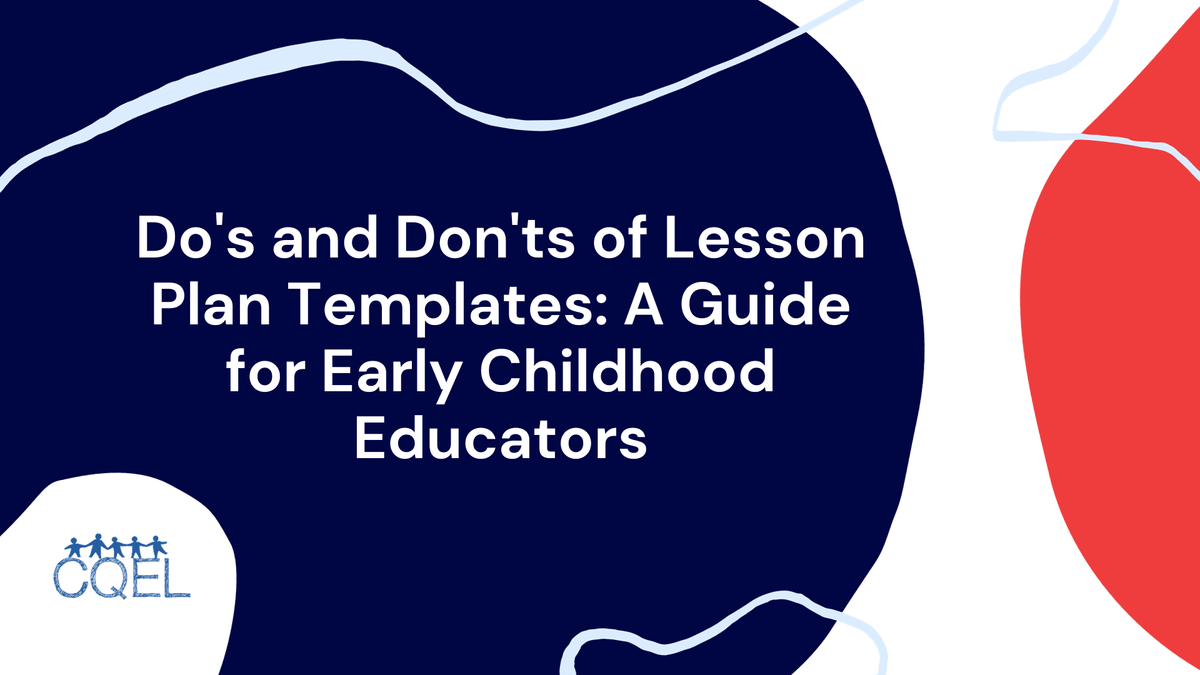Do's and Don'ts of Lesson Plan Templates: A Guide for Early Childhood Educators
Lesson plan templates can be both a teacher's best friend and a creativity-stifling enemy. Used wisely, they offer structure and guidance, ensuring our preschoolers engage in enriching, developmentally appropriate activities.

Lesson plan templates can be both a teacher's best friend and a creativity-stifling enemy. Used wisely, they offer structure and guidance, ensuring our preschoolers engage in enriching, developmentally appropriate activities. But used uncritically, they can morph into rigid boxes, suffocating our own valuable insights and the unique needs of our young learners. So, let's embark on a journey of template navigation, exploring the essential "do's" and "don'ts" for early childhood educators, ensuring our lesson plans become springboards for joyful learning, not restrictive blueprints.
Before You Use:
- Assess Your Needs: Don't just grab the first template you find. Reflect on your specific curriculum, class dynamics, and children's interests. Do you need a framework for a science experiment, a thematic unit, or a specific developmental skill? Choose a template that aligns with your learning goals, not the other way around.
- Know Your Learning Objectives: What do you want your children to learn, experience, or develop? Having clear objectives in mind will guide your template selection and ensure every activity contributes to a meaningful learning journey.
Do's for Template Exploration:
- Embrace Flexibility: See your template as a starting point, not a rulebook. Adapt it to fit your own teaching style, the needs of your children, and the ever-evolving dynamic of your classroom. Add, subtract, and modify activities to create a plan that feels uniquely yours.
- Focus on Engagement: Choose a template that prioritizes engaging, hands-on activities over rote memorization and worksheets. Look for opportunities for exploration, play, and creative expression. Remember, young children learn best through active participation, not passive observation.
- Incorporate Differentiation: No two children learn exactly the same way. Choose a template that allows for adaptations to cater to individual learning styles and abilities. Offer multiple materials, varied activity levels, and alternative pathways to reach the same learning objectives.
Don'ts of Template Trap:
- Template Tyranny: Don't become a slave to the template. Don't hesitate to ditch what doesn't work, adjust timings, and even completely scrap sections that feel forced or irrelevant. Remember, you're the expert in your classroom, not the template designer.
- One-Size-Fits-All Fallacy: Resist the allure of the generic template promising to fit every lesson plan under the sun. Early childhood education is about recognizing and nurturing individual uniqueness. A cookie-cutter approach stifles both your creativity and your children's learning potential.
- Overlooking Developmentally Appropriate Practice (DAP): Don't let the lure of a well-designed template overshadow the principles of DAP. Ensure your activities are age-appropriate, playful, and cater to the whole child – social, emotional, physical, and cognitive development.
Remember: Lesson plan templates are tools, not mandates. Use them to guide your journey, not define it. Infuse them with your own passion, adapt them to your unique environment, and most importantly, listen to the whispers of your children's curiosity. By navigating the terrain of templates with both flexibility and intentionality, you'll craft lesson plans that spark wonder, ignite learning, and leave your preschoolers begging for more.
Bonus Tips:
- Create your own templates based on successful lesson plans you've developed.
- Share and collaborate with colleagues, exchanging templates and adapting them to different learning contexts.
- Don't be afraid to experiment and try new things, even if it means going off-template now and then.
Additional Resources:
- ZERO to THREE: https://www.zerotothree.org/: https://www.zerotothree.org/: https://www.zerotothree.org/: https://www.zerotothree.org/
- Center on the Developing Child at Harvard University: https://teachingstrategies.com/: https://teachingstrategies.com/: https://teachingstrategies.com/: https://teachingstrategies.com/
- Learning to Read: https://www.childrenlearningreading.org/: https://www.childrenlearningreading.org/: https://www.childrenlearningreading.org/: https://www.childrenlearningreading.org/
